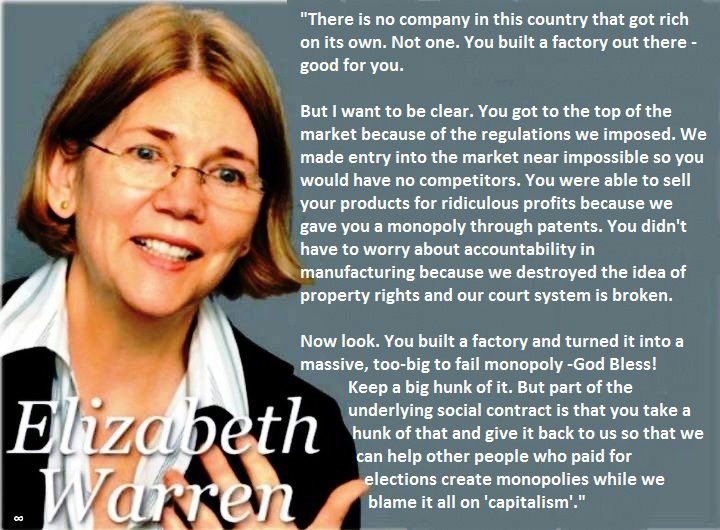Since the turn of the century it has become common practice for the state to use its monopoly on force to expand its monopoly on natural resources. Canada and Norway both maintain a monopoly on minerals through state ownership of extraction companies and required licensing for any extraction by third-parties. Even the State of Minnesota has maintained mineral rights on most property sold after the state of the 20th century. Unfortunately the state, lacking the market feedback system, is unable to extract resources efficiently and usually squander any monetary gains from resource extraction on nonproductive uses such as expanding bureaucracy, maintaining a powerful military, and giving handouts to cronies. In fact many countries with abundant natural resources end up in worse positions than countries without such resources, a happening so common the term resource curse was coined to describe it.
Peru is a perfect example of this. During the 1840s an island off of Peru was discovered than held a great deal of guano:
In 1839, Peru was a devastated nation. Debt and destruction in the aftermath of both the War of the Confederation (1836–1839) and the War of Independence (1822–1825), a crushing debt default in 1826, and several hundred years as a Spanish colony had left its economy small and craft dominated, without even a banking system.
But in the early 1840s, explorers made an exciting discovery. Due to an uncharacteristic lack of rainfall and the unique variety of birds nesting there, Peru’s Chincha Islands were found to be covered by mountains of bird excrement several hundred feet high in places, which had accumulated over many centuries. They were thought to be the most enormous guano deposits in the world — and of a particularly high quality — at a time when guano was used worldwide for fertilizer. So, out of nowhere, a valuable natural resource was found, one which promised — if managed properly — to produce wealth that could “stagger the dreams of Oriental imagination,” possibly ushering in a new era of development and progress.
At the time guano was almost like gold since it was used by almost everybody as fertilizer. Guano was so valuable that the United States passed the Guano Islands Act:
Whenever any citizen of the United States discovers a deposit of guano on any island, rock, or key, not within the lawful jurisdiction of any other Government, and not occupied by the citizens of any other Government, and takes peaceable possession thereof, and occupies the same, such island, rock, or key may, at the discretion of the President, be considered as appertaining to the United States.
The act was used by the United States to lay claim to some 100 islands, so this wasn’t a law used sparingly to claim one or two islands. Needless to say with guano being such a valuable resource at the time the Peruvian government decided to law monopoly claim to their newly discovered treasure trove. Money made from selling the guano was used as money obtained by a state is usually used, for mostly frivolous projects:
Public works and private prebends remade the city … with stately museums, parks, plazas, academies, boulevards, mansions, and theaters, not to mention the latest in potable water systems and Italian opera. Imports — everything from workaday textiles to lavish accessories and vintage French wines [arrived in the city].
Since the state doesn’t have to concern itself with market feedback it is always apt to dump great deals of money into unwanted projects. How useful is a museum, mansion, or theater in a country where a majority of the population live in poverty? No very useful, which is noted by the fact no entrepreneur invested money in any of those enterprises. Unfortunately the more of those things a country has the longer its political dick is and countries love political dick measure competitions.
As these investments never return any profit they lead to economic ruin. We see this in the United States today with all the spending on Medicare, Medicaid, offense defense, bailouts, etc. have failed to return any profit and are leading to the slow collapse of our sham economy. When you keep dumping money into failed enterprises the only possible outcome is total failure, something Peru experienced when that state’s meddling in the guano market lead to other sources of fertilizer being sought out. At some point all resources become more expensive than people are willing to pay and at those times alternatives are researched by individuals wanting a piece of the pie from currently disgruntled consumers. When you can pay $5.00 for a pound of fertilizer or $50.00 for a pound of fertilize the choice of which one to choose becomes obvious:
The European crisis hammered the Peruvian economy in two ways: first, because the Peruvian government had incrementally (and with disregard for competitive substitutions) increased guano prices so much, stricken farmers turned to other, lower-priced fertilizers; demand for shipments from the Chincha Islands dried up. Second, with London money and commodity markets frozen, lenders had little appetite for extending additional credit to once-again-debt-encumbered Peru.
Peru’s gravy train came to a screeching halt. All of the sudden the worthless investments being made by the state became impossible to continue as money was drying up. What’s a state to do in such a situation? The only thing a state knows how to do, use violence in an attempt to maintain its monopoly:
In response to the economic crisis, in 1875, Pardo — now president of Peru — ordered the military to seize the southern nitrate fields on the border with Chile in an effort to offset the decline of the guano business with another source of fertilizer revenues. Even though the state hastily expropriated land and facilities from private investors, it was too little too late. Work on the railroad projects halted in August of 1875. Over the next few months, a variety of other government projects defaulted amid a widening financial contagion culminating in January 1876, as Peru defaulted on its sovereign debt for the second time in a century: mountains of loans from European banks in stark juxtaposition against diminished avian dung heaps.
This should be a familiar formula for anybody who pays attention to foreign affairs. Saddam Hussein ordered the invasion of Kuwait because their cheap oil flooded the market and challenge Iraq’s primary source of income. The United States has a history of invading or otherwise intervening in countries with vast natural resources including Iran, Iraq, Afghanistan. In fact the British and United States lead overthrow of the Iranian government in 1953 happened shortly after the country nationalized its oil resources (which was previously controlled by Anglo-Iranian Oil Company, a British owned company). Peru demonstrates such tactics are nothing new, the state has a long history of military invasions to seize natural resources.
Meanwhile the free market allows for peaceful distribution of natural resources to productive uses, since entities that invest resources into unproductive uses face insolvency in a hurry. On top of that the threat of insolvency prevents private entities from squandering resources on massive frivolous endeavors. The state, being free of market feedback, has no such worries and thus ends up dumping massive amounts of money into enriching itself:
In hindsight, “guano … proved a great ‘lost opportunity’ for [Peruvian] development … [as] state investments stymied possibilities for national entrepreneurs, diversification, and gains in domestic productivity.” In roughly four decades, under the supervision and at the direction of the government, between 11 and 12 million tons of excrement fertilizer were shipped, earning $500 million in revenues. (Another estimate holds the number at more than 20 million tons shipped and $2 billion in revenue.) But in the end, 53 percent of all of the guano revenue was spent on expanding the bureaucracy and the military, 12 percent on direct transfer payments, and 7 percent on reducing tributary impositions. Twenty percent had been spent on railroads.
Peru’s politicians spent 53 percent of all guano revenues on enriching themselves, creating more dependency on the state, and enhancing the military so they could steal other country’s stuff. None of these things are valuable for anybody besides the state and its cronies. That’s what states do and we should keep it in mind. It doesn’t matter where the money comes from either. Whether the state gets money from a monopoly on resources, taxation, or tariffs it will be spent mostly on worthless things. If we listen to those demanding the rich be taxed heavier where do you think that additional money will go? It won’t be Medicare, Medicaid, or Social Security; it’ll go to funding the military, hiring more government employees, and lining the pockets of state cronies.
When the state gets money it’s lose/lose unless you’re tied to the state. This is because any money obtained by the state is stolen. In the case of Peru’s claim of the guano filled island the property was stolen from individuals who could have put the guano to productive uses in the free market.

